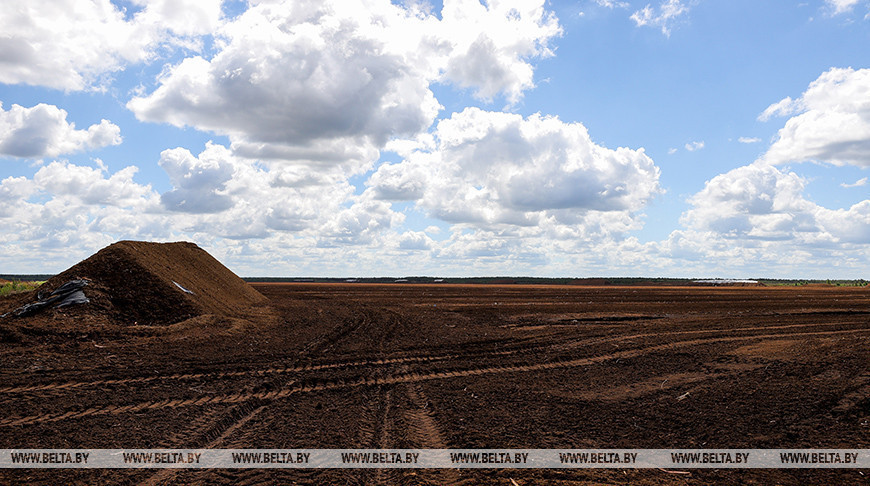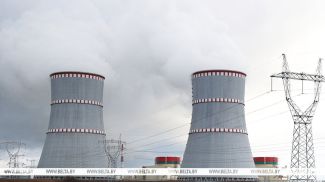
LYAKHOVICHI DISTRICT, 4 September (BelTA) – Belarusian peat is in high demand on the international market and is now supplied to nine countries worldwide, BelTA learned from Belarusian Energy Minister Denis Moroz during a press tour dedicated to the Oil, Gas and Fuel Industry Workers’ Day.
“An important fuel component in our country is our, I dare say, national treasure – peat. Until the 1960s, Belarus’ entire energy sector and industry were largely reliant on this resource. Even with the introduction of natural gas and the large-scale reconstruction of our energy infrastructure, peat retained its place in the national fuel and energy balance. Belarusians have always approached energy issues wisely, ensuring the balance includes as many elements as possible,” the minister noted.
According to Denis Moroz, peat now accounts for about 5% of Belarus’ total energy mix and about 15% in the structure of local fuel types. “Belarus is one of the world leaders in peat extraction. Our country is the number one producer of peat briquettes worldwide. This essential product is used by both households and public institutions for heating in the cold season,” he explained.
The minister emphasized that in Belarus peat is not only fuel. “In recent years, we have paid special attention to non-fuel applications. Several years ago, an enterprise for producing cover soils for mushrooms was launched and now fully meets the country’s domestic demand. Furthermore, we are engaged in the deep processing of peat to obtain humates. Humate-based additives are already certified, they increase crop yields and contribute to soil restoration,” he said.
In his words, the plans include producing dry powdered humates and utilizing peat as feed additives and bedding in agriculture. “The non-fuel sector is growing at a rate of approximately 30% annually. The production volume of non-fuel products has exceeded 100,000 tonnes, a 30% year-on-year increase,” Denis Moroz noted.
The minister added that external restrictions have not become an obstacle to the development of the industry. “Despite sanctions pressure and the withdrawal of European partners, we have reoriented our markets. Belarusian peat is in demand all over the world, and this year, non-fuel products are supplied to nine countries. I would like to single out the People’s Republic of China – we have increased supplies to this market by over four times in 2025,” Denis Moroz concluded.
“An important fuel component in our country is our, I dare say, national treasure – peat. Until the 1960s, Belarus’ entire energy sector and industry were largely reliant on this resource. Even with the introduction of natural gas and the large-scale reconstruction of our energy infrastructure, peat retained its place in the national fuel and energy balance. Belarusians have always approached energy issues wisely, ensuring the balance includes as many elements as possible,” the minister noted.
According to Denis Moroz, peat now accounts for about 5% of Belarus’ total energy mix and about 15% in the structure of local fuel types. “Belarus is one of the world leaders in peat extraction. Our country is the number one producer of peat briquettes worldwide. This essential product is used by both households and public institutions for heating in the cold season,” he explained.
The minister emphasized that in Belarus peat is not only fuel. “In recent years, we have paid special attention to non-fuel applications. Several years ago, an enterprise for producing cover soils for mushrooms was launched and now fully meets the country’s domestic demand. Furthermore, we are engaged in the deep processing of peat to obtain humates. Humate-based additives are already certified, they increase crop yields and contribute to soil restoration,” he said.
In his words, the plans include producing dry powdered humates and utilizing peat as feed additives and bedding in agriculture. “The non-fuel sector is growing at a rate of approximately 30% annually. The production volume of non-fuel products has exceeded 100,000 tonnes, a 30% year-on-year increase,” Denis Moroz noted.
The minister added that external restrictions have not become an obstacle to the development of the industry. “Despite sanctions pressure and the withdrawal of European partners, we have reoriented our markets. Belarusian peat is in demand all over the world, and this year, non-fuel products are supplied to nine countries. I would like to single out the People’s Republic of China – we have increased supplies to this market by over four times in 2025,” Denis Moroz concluded.













